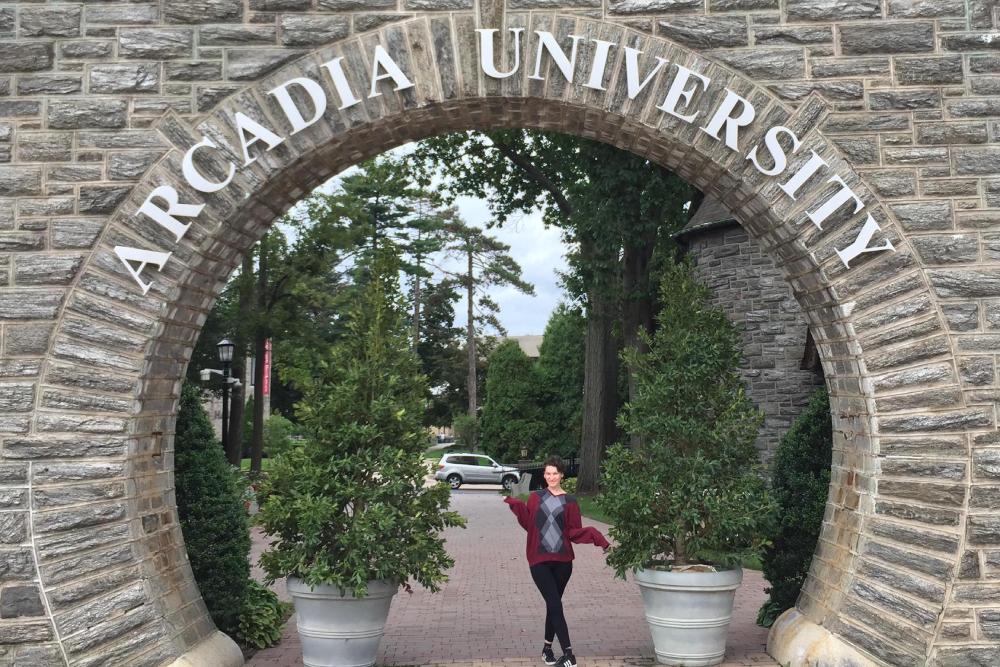Breaking Free From the Gender Binary

The moment I stepped onto Arcadia’s campus for an Open House during my senior year of high school, I felt that I was home: safe, comforted, and accepted. This feeling is what initially encouraged and accelerated my desire to explore who I was.
I have identified as bisexual since the seventh grade. Although my friends were tolerant and accepting— I surrounded myself with people who were like-minded— my hometown was much more conservative than here. I faced some pushback from people I knew, but I never once doubted who I was in regard to my sexuality. My gender, however, is a different story.
I’ve had feelings of unease and discomfort with my gender and body since childhood. Since I thought these feelings were universal, I went through most of my adolescence without questioning my gender. It wasn’t until my junior and senior years of high school that I started to understand that most people didn’t experience this discomfort in their body, but I didn’t allow myself to explore what that realization could mean.
The accepting aura at Arcadia, specifically in the Department of Sociology, Anthropology, and Criminal Justice, helped me finally come to terms with my gender identity. I took Introductory Sociology in the first semester of my freshman year, and one chapter focused on gender and sexuality. We discussed that gender is a spectrum, with female on one side and male on the other. My professor explained that some people fall in the middle, others lean toward one side, and some feel that they aren’t on the spectrum at all.
I realized that being in an environment that taught about variance in gender and sexuality was new to me, and hearing a professor verify that my feelings were valid and normal made me fully realize that I wasn’t cisgender.
– Kathryn Jones
This moment made my heart race. I thought to myself, “I already know this information— why do I feel so excited?”
I realized that being in an environment that taught about variance in gender and sexuality was new to me, and hearing a professor verify that my feelings were valid and normal made me fully realize that I wasn’t cisgender (when your gender identity corresponds to your sex given at birth).
In that moment, my life really did change. After the initial excitement calmed down, I looked inside myself and back on my experiences through life—specifically at the feelings of discomfort with my body in regards to my given sex, which I have come to understand as “gender dysphoria.” After talking to a few wonderful and kind friends, who helped me explore what I was feeling, I was comfortable enough to come out. I can now say, with pride, that I am non-binary, which, to me, means that I am not exclusively male or female. I can now happily respond to the question “What are your pronouns?” with “they/them!”

Contributing to the supportive aura on campus are a few organizations and programs, such as the PRIDE Club, which is a safe space for LGBTQIA+ people and allies to discuss and support activism on campus. Counseling Services at Arcadia also offer a support group for LGBTQIA+ related issues called “Questioning, Coming Out, and Beyond,” which meets from 3 to 3:45 p.m. every Wednesday this semester until Dec. 5.
Resident assistants (RAs) also help provide an open and accepting environment for students. Mairin Higgins, RA of 2nd West Kistler Hall, said that making her hall a safe space was “absolutely a priority,” and that she and other RAs were “recommended to choose a gender-neutral theme so that anyone can feel at home.” In order to establish that her hall was a safe space, Mairin put up bulletin boards with information on different LGBTQIA+ identities, pushed for gender-neutral bathrooms, and enforced during the first meeting that “any nonsense would not be tolerated. Hate speech and anything of the sort is not okay.”
I am thankful that Arcadia has allowed me a safe non-discriminatory space to explore my gender identity. I finally feel fully like myself. With these groups and individuals pushing for acceptance and tolerance on campus, I hope that more people feel free to explore their identities— and become more tolerant of those different from themselves.



